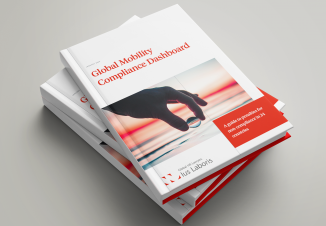
Up until 2018 foreign employees who were not citizens of the European Economic Area or Switzerland needed two separate documents to be permitted to work and reside in Belgium: a work permit and a visa or residence permit. There were also two separate application procedures to be followed: first the employer had to obtain a work permit B, based on which the employee could apply for a separate visa or residence permit.
Since this double permission and application procedure was not in line with the European Single Permit Directive, Belgium had to adapt. As a result, from 2019 new rules apply throughout Belgium and employers will need to align their internal processes and timelines accordingly. In addition, work permit C (previously granted to some individuals who had a right to reside in Belgium for reasons other than work: see below for further details) has been abolished and is replaced by a note on the employee’s residence permit.
1. Single Permit and a single application procedure to work and reside in Belgium for more than 90 day
From 2019 employers must apply for a Single Permit through a single application procedure leading to a combined Single Permit encompassing both permission to work and to reside in Belgium for more than 90 days. The old rules (work permit B and, depending on the circumstances of the case, a separate visa and/or residence permit) continue, however, to apply for foreign employees working in Belgium for less than 90 days, frontier workers and au pairs.
The employer must submit the application to the competent Regional Authority and include all documents relating to permission to work (e.g. the employee’s degrees) and permission to reside in Belgium (e.g. evidence of no criminal record). After this, the employee is no longer required to make a separate visa or residence permit application. If the file is complete, the competent Regional Authority and the Immigration Office will examine the file in parallel. For example, the Regional Authority will examine if the employee meets the required salary threshold and has the required degrees for permission to work as highly skilled employee, whereas the Immigration Office will perform a security check. If both authorities reach a positive decision, the employee will be granted a Single Permit authorising him or her to work and reside in Belgium for more than 90 days. If the employee is still abroad, he or she will first be granted a temporary visa allowing him or her to come to Belgium as the Single Permit can only be delivered in Belgium.
2. Single but longer application procedure and more preparation time for employer
Employers will need to adapt their internal timelines to obtain the required permission to employ foreign employees for more than 90 days in Belgium.
First, employers will need to consider leaving more time to prepare the application since the documents regarding the employee’s permission to reside in Belgium such as evidence of absence of a criminal record (with Apostille or legalised) need to be submitted from the start of the procedure (whereas before the criminal record documentation only needed to be submitted once work permit B had been obtained). However, practice shows that it often takes weeks to obtain evidence of absence of a criminal record.
Further, it may take up to four and a half months until a decision regarding the Single Permit is taken and during that time the employee is not allowed to work. Before, a work permit B was usually granted within four to six weeks and the employee could immediately start working provided he or she was in Belgium legally.
3. Renewals at least two months in advance and proof of LIMOSA declaration
Employers need to apply for a renewal of the Single Permit at least two months before its expiry date (opposed to at least one month in advance under the ‘old rules’).
In the event of a secondment, proof of the LIMOSA declaration needs to be submitted when applying for renewal.
4. Exemptions and former work permit C
Employees who were exempt from requiring permission to work under the ‘old rules’ or who were eligible for a work permit C because of their specific residence situation may continue to work. Work permit C, however, has been abolished. From now, the residence permits of employees who were previously eligible for work permit C or were exempt because of their specific residence situation mentions that they are permitted to work (the permission may be limited or subject to certain conditions). It concerns in particular recognised refugees, asylum seekers after four months, students (under certain conditions), diplomatic personnel, foreign employees with a permanent residence permit (electronic B-card, C-card or D-card), foreign family members of EU citizens (electronic F or F+ card), individuals applying for family reunification (conditions), among others.
The employer must check if the employees have a valid residence permit, be able to submit a copy of this valid residence permit for the entire period of employment to the Social Inspectorate in the event of checks and make the relevant DIMONA or LIMOSA declaration. Non-compliance with these obligations may result in important criminal or administrative penalties (level four penalties).
5. Transition measures
Work permits granted in 2018 remain valid until they expire. Likewise, applications for work permits submitted before the entry into force of the new rules will still be processed under the ‘old rules’.
6. New rules for employing foreign employees in Flanders from 2019
Besides the new procedural rules that apply throughout Belgium, the conditions for employing foreign employees in Flanders have also been significantly reformed from 2019. The Flemish Region introduced a new economic migration model based on three separate profiles: highly qualified and special profiles, certain medium-skilled profiles (only for shortage professions listed in a dynamic shortage profession list) and profiles in a residual category subject to a labour market test and for whom ‘special economic and social reasons’ must be established. These new rules only apply in Flanders and not in Brussels or Wallonia.
Conclusion
Employers must be aware of the new single but longer application procedure in Belgium to obtain a Single Permit permitting a foreign employee to work and reside in Belgium for more than 90 days and the changes for employees who are permitted to work because of their specific residence situation. Internal processes and immigration strategies should be amended accordingly. In Flanders, not only the procedure but also the conditions have changed.


